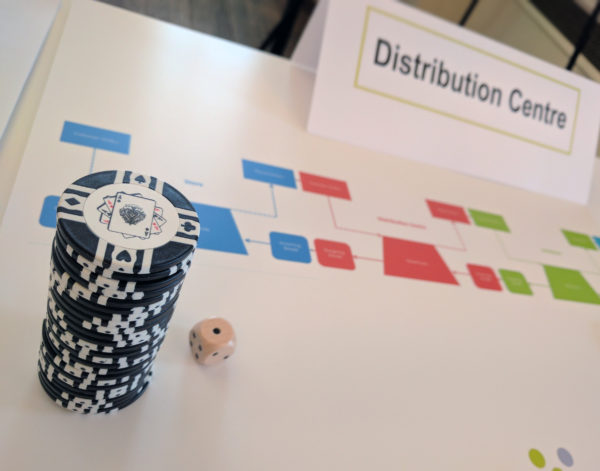Supply Chain Simulation
The Beer Game – Understanding Your Supply Chain

As a first step to getting your team to understand why optimising your supply chain is so important, we can run a bespoke version of the Beer ‘supply chain simulation’ Game for you:
The Beer Game (or beer distribution game) was originally invented in the 1960’s by Jay Forrester at MIT as a result of his work on systems dynamics. It’s a role-play simulation game that lets participants experience the potential problems of traditional supply chains.
This competitive business simulation game demonstrates the need for coordinationthroughout the supply chain. Suppliers, manufacturers, sales people and customers all have their own – often incomplete – understanding of what real demand is.
Each group has control over only a part of the supply chain, but each group can influence the entire chain by ordering too much or too little. Each group is influenced by decisions that others are making.
This lack of coordination, coupled with the ability to influence while being influenced by others, leads to the Bullwhip Effect (shortages and overstocks across the supply chain).
Objectives & Outcomes
- The object of the game is to powerfully demonstrate, through simulation, how inter-related and inter-dependant a real supply chain is and the effect that people can have on each other when working in a typical supply chain that involves multiple connected parties.
- The simulation seeks to achieve the above with all the pressures of playing in a real world, complex operating environment where players are at the mercy of forces outside of their direct control in the system.
- The objective through all the iterations is to minimise cost while at the same time maximising service to customers.
Outcomes of Participation in the beer game include:
- An appreciation of supply chain dynamics.
- Understanding of the communication flows required for effective supply chain management.
- Understanding the effect of supply chain operation on inventory.
- The development and effective implementation of Sales and Operations Planning processes.
- Understanding other development needs for the group members.
Feedback from Majestic Wine’s Supply Chain Director (Neil Firth) about the Beer Game:
I wanted training that was different yet educational, to get my team to think and be prepared for any supply chain scenario. We worked with the Supply Chain Academy to develop a bespoke version of the beer game, to help them understand what happens across the supply chain. It was a well-run event that the team learnt a lot from. Read the Majestic Wine Case Study here.
The simulation is a powerful tool for ensuring people from different functional areas (sales, marketing, finance, manufacturing, procurement, customer service, warehouse, distribution etc) acquire a common understanding of how much the supply chain (and business costs) can be affected by such things as lead times, customer demand fluctuations, out of stocks, supplier behaviour and supply fluctuations etc.
